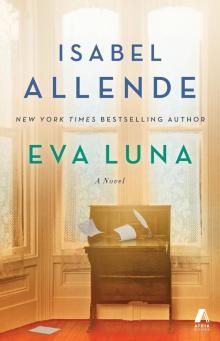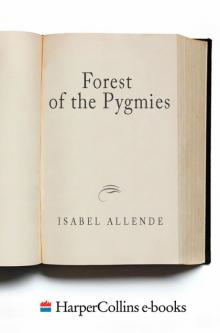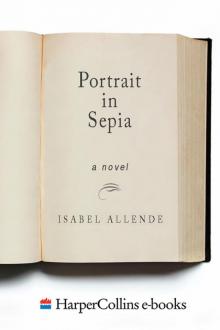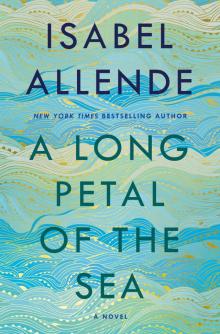- Home
- Isabel Allende
A Long Petal of the Sea Page 19
A Long Petal of the Sea Read online
Page 19
Following Father Urbina’s instructions, they didn’t call a doctor, but Orinda Naranjo. She arrived looking quite professional and announced in her plaintive whine that the birth could come at any time now, even though according to her calculations it wasn’t due for another two weeks. She advised the nuns to keep the patient lying flat with her legs up, and to put cold compresses on her stomach. “Pray, because the heartbeats are faint; the baby is very weak,” she added. On their own initiative, the nuns stemmed the hemorrhage with cinnamon tea and warm milk with mustard seeds.
When he heard the midwife’s report, Father Urbina ordered Laura del Solar to move into the convent to be with her daughter. It would be good for both of them, he said, and help them to be reconciled. She insisted they weren’t angry with each other, but he explained that Ofelia was furious with everyone, even God. Laura was given a cell identical to her daughter’s, and for the first time in her life was able to experience the peace of religious life she had so much desired. She adapted at once to the icy blasts inside the building and the rigid litany of religious offices. She would get out of bed before dawn to wait for first light in the chapel praising the Lord, attend Mass at seven, and have a lunch of soup, bread, and cheese with the congregation in silence while someone read aloud the scripture selection of the day. In the afternoon she had a few hours for private meditation and prayer, and then at dusk she would join the nuns for vespers. Supper was also eaten silently, and was as frugal as lunch, although a little fish was added. Laura was happy in this female haven, and even the rumbles of hunger and lack of sweet things pleased her with the thought of how much weight she was losing. She loved the enchanted garden, the high, wide corridors where footsteps resounded like castanets, the perfume of candles and incense in the chapel, the creak of the heavy doors, the sound of the bells and chants, the murmur of prayer. The mother superior exempted her from work in the garden, the embroidery workshop, the kitchen or laundry, so that she could fully attend to the physical and spiritual needs of Ofelia, who, at Father Urbina’s urging, she had to convince to accept adoption, which would legitimize this poor creature born of lust, and offer Ofelia the chance to rebuild her life. Ofelia would drink the magic potion in another glass of wine and doze like a lifeless doll on her horsehair mattress, watched over by the novices and lulled by her mother’s purring voice, although she didn’t take in a word of what her mother was saying. Father Urbina did them the favor of visiting them, and after witnessing yet again this misguided young woman’s stubbornness, he took Laura del Solar out into the garden under an umbrella while a rain as fine as dew fell on them. Neither of them ever repeated the subject of their conversation.
Ofelia had no recollection of the birth, which she was told was long and difficult, or of the days that followed. It was as if she hadn’t lived through them, thanks to the ether, morphine, and Orinda Naranjo’s mysterious potions that left her unconscious for the rest of that week. She came around gradually, so lost that she couldn’t even remember her name. As her mother was constantly at prayer bathed in tears, it fell to Father Urbina to give Ofelia the bad news. He appeared at the foot of her bed as soon as the drugs had been reduced and she had recovered sufficiently to ask what had happened and where her daughter was. “You gave birth to a little boy,” the priest informed her in the most compassionate tone he could muster, “but God in his wisdom took him a few minutes after he was born.” He explained that the baby had been strangled by the umbilical cord around his neck, but fortunately they succeeded in having him baptized, so that he did not go to limbo but to heaven with the angels. God spared the innocent child suffering and humiliation on this earth, and in his infinite mercy was offering her redemption. “Pray a lot, my child. You must overcome your pride and accept divine will. Ask God to forgive you, and to help you bear this secret alone, with dignity and in silence, for the rest of your life.”
Urbina tried to console her with quotations from the holy scriptures, but Ofelia began to howl like a she-wolf and to thrash around in the strong hands of the novices who were trying to restrain her, until she was forced to swallow another glass of wine laced with opium. And so, from glass to glass, she survived almost two weeks half-asleep, until even the nuns thought this was enough of praying and potions, and that she should be brought back to the land of the living. When she was able to get to her feet, they saw she had deflated considerably and was again shaped like a woman rather than a zeppelin.
Felipe went to fetch his sister and mother from the convent. Ofelia insisted on seeing her son’s grave and so they visited the cemetery in the nearby village, where she laid flowers on the spot marked with a white wooden cross inscribed with the date of death but no name, where the child who had not lived lay. “How can we leave him all alone here? It’s so far to come and visit him,” sobbed Ofelia.
On their return to Calle Mar del Plata, Laura didn’t tell her husband all that had gone on in the previous few months, because she thought Felipe had kept him informed, and because Isidro preferred to know as little as possible, remaining faithful to his habit of staying away from the emotional extravagances of the female members of the family. He greeted his daughter with a kiss on the forehead as he did on every normal morning; he was to die thirty-three years later without ever asking after his grandson. Laura sought solace in the church and sweet things. Baby had reached the last stage of his short life, and took all the attention of his mother, Juana, and the rest of the family, which meant Ofelia was left in peace with her sadness.
* * *
—
THE DEL SOLAR FAMILY could never be entirely sure they had avoided the scandal of Ofelia’s pregnancy, as traditionally those sorts of rumors darted like birds in the periphery of the family. Ofelia could not fit into any of her old dresses, and her keenness to buy and have new ones helped distract her somewhat from her sorrow. It was at night that the tears flowed, since in the dark the memory of her child was so intense she could clearly feel him kicking playfully in her belly, and drops of milk dripped from her nipples. She went back to her painting classes, seriously this time, and took her place once more in society, unperturbed by the curious looks and whispers behind her back.
Rumors reached Matias Eyzaguirre in Paraguay, but he dismissed them as yet another example of the prudishness and spite typical of his homeland. When he heard that Ofelia was ill and had been taken to the countryside, he wrote to her once or twice. When she didn’t reply, he sent a telegram to Felipe inquiring after his sister’s health. “It’s following the usual course,” Felipe answered. This would have seemed suspicious to anyone but Matias, who wasn’t stupid, as Ofelia thought, but one of those rare good men. At the year’s end, the obstinate suitor was given permission to leave his post for a month to take a vacation in Chile, far from the humid heat and windstorms of Asuncion.
He arrived in Santiago one Thursday in December, and by Friday was already standing at the door of the French-style house on Calle Mar del Plata. When she admitted him, Juana Nancucheo was as frightened as if it had been the police, because she imagined he had come to take Ofelia to task for what she had done, but Matias had a very different objective: he was carrying his great-grandmother’s diamond ring in his pocket. Juana led him through the house, darkened both because in summer the shutters were left closed and in anticipation of little Leonardo’s death. There were none of the usual fresh-cut flowers or the smell of peaches and melons from the country estate that usually filled the air, no music on the radio, not even the dogs’ noisy welcome. All that remained was the looming presence of the heavy French furniture and the centuries-old portraits in their gilded frames.
He found Ofelia out among the camellias on the terrace, seated beneath a canopy as she sketched with a pen and China ink, shielded from the sun by a straw hat. He paused for a moment to observe her, as in love as ever, oblivious to the extra pounds she had put on. Rising to her feet, Ofelia was so bewildered she took a step backward: she h
ad never expected to see him again. For the first time, she could appreciate him in full for what he was and not as the begging, indulgent cousin she had duped for more than a decade. She had thought of him a great deal in recent months, adding her loss of Matias to the price she was paying for her mistakes. The aspects of his character that had bored her in the past now seemed like rare virtues. To her he appeared different, more mature and solid, handsomer.
Juana brought them iced tea and dulce de leche pastries, then hovered behind the camellias trying to overhear them. As she often told Felipe when he scolded her for listening behind doors, her position in the family meant she had to stay well informed. “Why did Ofelita have to break young Matias’s heart? He’s such a good person; he doesn’t deserve to suffer like that. Just imagine, niño Felipe, before he could even ask she told him everything that had happened. And in detail.”
Matias had listened in silence, wiping the sweat from his face with a handkerchief, overwhelmed by Ofelia’s confession, the heat, and the sweet scent of roses and jasmine in the garden. When she had finished, it took him a good while to calm his emotions and conclude that, in reality, nothing had changed. Ofelia was still the most beautiful woman in the world, the only one he had ever loved and would continue to love to the end of his days. He tried to tell her as much with the eloquence he had shown in his letters, but the flowery language was beyond him.
“Please, Ofelia, marry me.”
“Didn’t you hear what I’ve been telling you? Aren’t you going to ask me who the father of the child was?”
“That doesn’t matter. The only thing that does is if you still love him.”
“It wasn’t love, Matias. It was lust.”
“Then it needn’t concern us. I know you require time to recover, although I suppose no one truly recovers from the death of a child, but when you are ready, I’ll be waiting for you.”
He took the little velvet box from his pocket and placed it delicately on the tea tray.
“Would you say the same if I had an illegitimate child in my arms?” she challenged him.
“Of course I would.”
“I imagine that nothing I’ve said comes as a surprise to you, Matias: you must have heard the rumors. My bad reputation will follow me wherever I go. It could ruin your diplomatic career, and your life as well.”
“That’s my problem.”
* * *
—
BEHIND THE CAMELLIAS, Juana Nancucheo couldn’t see Ofelia take the small velvet box and examine it closely in the palm of her hand as if it were an Egyptian scarab; all she noticed was the silence. She didn’t dare poke her head through the bushes, but when she thought this had gone on long enough, she emerged from her hiding place and approached them to remove the tea tray. It was then she saw the ring on Ofelia’s fourth finger.
They wanted to be married without any fuss, but for Isidro del Solar that was tantamount to admitting guilt, besides which his daughter’s wedding was a wonderful opportunity to repay a thousand social obligations, and while they were at it give a slap in the face to the bastards spreading gossip about Ofelia. He himself hadn’t heard any, but on more than one occasion in the Club de la Union he thought he heard people laughing behind his back. Preparations for the wedding were minimal, since the bride and groom had everything ready from the year before, including sheets and tablecloths embroidered with their initials. They published the announcement in the society pages of El Mercurio, and the dressmaker quickly made a wedding gown similar to the previous one, but a few sizes larger.
Father Vicente Urbina did them the honor of marrying them. His presence itself was a vindication of Ofelia’s reputation. When readying the couple for the sacrament of marriage with the usual warnings and advice, he delicately avoided the question of the bride’s past. Ofelia, however, took great pleasure in telling him that Matias knew what had happened and so she wouldn’t have to carry the secret alone for the rest of her life. The two of them would bear it together.
Before leaving for Paraguay, Ofelia wanted to go to the country cemetery where her child was buried. Matias accompanied her. They straightened the white cross, laid a bunch of flowers on the grave, and said prayers. “One day, when we have our own plot in the Catholic cemetery, we’ll transfer your little boy to be with us, as it should be,” said Matias.
They had a week’s honeymoon in Buenos Aires, then traveled overland to Asuncion. Those few days were enough for Ofelia to sense that in marrying Matias she had made the best decision of her life. I’m going to love him as he deserves, I’ll be faithful to him and make him happy, she promised herself.
And so at last this man, as stubborn and determined as an ox, was able to cross the threshold of his lavish and meticulously prepared house, carrying his wife in his arms. She weighed more than he had bargained for, but he was strong.
CHAPTER 9
1948–1970
Every being
Will have the right
To land and life
And that will be the bread of tomorrow.
—PABLO NERUDA
“Ode to Bread”
ELEMENTAL ODES
THE SUMMER OF 1948 SAW the beginning of a Dalmau family tradition that was to last a decade. Roser and Marcel spent the month of February in a cabin they rented by the beach. Like most Chilean husbands of his standing, who boasted they never took holidays because they were indispensable at work, Victor stayed in the city and joined them on weekends. According to Roser, this was simply another expression of Chilean machismo: how could they give up the freedom that being summer bachelors offered them? It would have been frowned upon for Victor to take a whole month off from the hospital, but the main reason for him remaining was that the beach always brought back bitter memories of the Argeles-sur-Mer internment camp. He had promised himself never again to set foot on sand.
In February 1948 Victor finally had the chance to return the favor he owed Pablo Neruda for choosing him among those to emigrate to Chile. The poet was a senator, but had already fallen out with the president, who was at loggerheads with the Communist Party even though it had supported him in his rise to power. Neruda didn’t spare his insults about someone he saw as the product of political machinations. He regarded him as a traitor, a small, vile, and bloody vampire. Accused of slander and calumny by the government, Neruda was stripped of his post as senator and hunted by the police.
Two leaders of the Communist Party, which was soon to be outlawed, appeared at the hospital to talk to Victor.
“As you know, there’s an arrest warrant out for Comrade Neruda,” they told him.
“I read about it in the newspaper today. I can hardly believe it.”
“He has to be hidden while he’s outlawed. We think the situation will soon be resolved, but if it isn’t, he’ll have to be somehow smuggled out of the country.”
“How can I help?” asked Victor.
“You can put him up for a while. Not long. He has to change houses frequently, to avoid the police.”
“Of course. It’ll be an honor.”
“It goes without saying that nobody is to hear about this.”
“My wife and son are on vacation. I’m alone in my house. He’ll be safe there.”
“We must warn you that you could face a serious problem as an accessory.”
“That doesn’t matter,” Victor replied, and gave them his address.
* * *
—
THIS WAS HOW PABLO Neruda and his wife, the Argentine painter Delia del Carril, came to live clandestinely in the Dalmau family home for two weeks. Victor gave up his bed for them and took them food prepared by the cook at the Winnipeg, in small containers so as not to attract the neighbors’ attention. The poet couldn’t help but notice the coincidence of the restaurant’s name. He also had to be supplied with newspapers, books, and whisky, the only thing that calmed
him down. He was desperate for conversation, as visits were restricted. He was an extrovert who lived life to the full; he needed not only his friends but his ideological adversaries with whom to practice his polemical verbal fencing. During the endless evenings in that reduced space, he went over the list of refugees he had granted a place on board in Bordeaux that distant August 1939 day, as well as other exiled Spanish men and women who arrived in Chile in the years that followed. Victor pointed out that Neruda’s refusing to stick to the government’s order to select only skilled workers, and instead including artists and intellectuals, had enriched the country with a wide range of talent, knowledge, and culture. In under a decade they had provided outstanding scientists, musicians, painters, writers, journalists, and even a historian whose dream was the monumental task of rewriting the history of Chile from its origins.
Being shut in was driving Neruda mad. He paced tirelessly up and down like a caged animal within the house’s four walls: he couldn’t even look out the window. His wife, who had given up everything, including her art, to be with him, had to struggle to keep him indoors. The poet grew a beard and filled the time by furiously writing his Canto General. To repay Victor’s hospitality, he read in his inimitably lugubrious voice earlier poems and some still unfinished. Listening to him infected Victor with an addiction to poetry that was to last throughout his life.
One night, without warning, two strangers arrived in dark coats and hats, even though the summer heat was still intense at that hour. They looked like detectives, but identified themselves as party comrades. Without explanation, they took the couple with them, barely giving them time to pack two suitcases with clothes and the unfinished poems. They refused to tell Victor where he could visit the poet, but warned him he might have to put Neruda up again, because it was hard to find refuges. There was a squad of more than five hundred policemen sniffing out the fugitive’s tracks. Victor explained that in a week’s time his family would be returning from the seaside, and his house would no longer be safe. In any event, it was a relief to recover peace and quiet. His guest had filled every nook and cranny with his huge presence.

 The Stories of Eva Luna
The Stories of Eva Luna The House of the Spirits
The House of the Spirits Paula
Paula Ines of My Soul
Ines of My Soul Of Love and Shadows
Of Love and Shadows Kingdom of the Golden Dragon
Kingdom of the Golden Dragon Daughter of Fortune
Daughter of Fortune City of the Beasts
City of the Beasts Maya's Notebook
Maya's Notebook Eva Luna
Eva Luna Zorro
Zorro In the Midst of Winter
In the Midst of Winter Forest of the Pygmies
Forest of the Pygmies My Invented Country: A Nostalgic Journey Through Chile
My Invented Country: A Nostalgic Journey Through Chile The Japanese Lover
The Japanese Lover Portrait in Sepia
Portrait in Sepia Island Beneath the Sea
Island Beneath the Sea The Soul of a Woman
The Soul of a Woman A Long Petal of the Sea
A Long Petal of the Sea Ines of My Soul: A Novel
Ines of My Soul: A Novel The Sum of Our Days
The Sum of Our Days